Review: Lexus IS250C
There are certain phrases that, when heard in the proper context, signal that one has truly arrived in life. Phrases like “your table is waiting,” and “would you like a drink before we take off?” clearly belong in this comforting category. Strangely, however, the phrase “welcome to Beverly Hills, here are the keys to your Lexus IS250C,” does not.
The day before leaving for Southern California, the Oregon skies opened up after a brief pause, blanketing Portland with what locals refer to as “liquid sunshine” [Ed: not that kind of liquid sunshine… we still brew beer the old-fashioned way up here]. Needless to say, a day of plying the sun-soaked Pacific
Coast Highway in a convertible of any kind should have felt like a deeply hedonistic event. And given the dearth of convertible options left in today’s market, the IS250C’s premium appeal should have only added to the Angelean fantasy. After all, I’m not back in the Oregon gloom trying to come up with new adjectives to apply to the Sebring Convertible. And yet, strangely, my time in the Lexus IS250C has left so light an impression that the moral clarity of a ‘bring ‘vert review seems almost worth the necessary day of automotive misery.
In any case, the 250C is wholly unworthy of the term “misery.” The 250C is a thoroughly solid attempt at unseating BMW’s 3-series hardtop convertible as the standard-issue conveyance of choice for the country club set, and other wealthy folk who see themselves as too sophisticated for a mid-life-crisis-mobile. And with rear-wheel-drive, a folding hard-top and legitimate room for four, it certainly has the on paper qualities needed to attract this desirable demographic.
Unfortunately, something is lost in translation between the handsome Lexus IS sedan and its coupe-convertible cousin. Where BMW’s convertibles are only barely distinguishable from their handsome coupe cousins by virtue of their delicate C-pillars, the IS-C is a hot mess of unfortunately differentiating elements. The solid C-Pillars which, in IS sedan duty bring the car’s visual heft rearward for more classic proportions, are reduced to thin elements rising
from a sloping hump under which the origami top retracts. The chopped roof abandons an awkwardly-proportioned rear deck, while lending neither the sleekness of a true coupe nor the visual coherence of the IS sedan. Though infinitely better-executed than the comparison suggests, the 250C ends up looking distressingly similar to a (Lord forgive me) Pontiac G6 Convertible.
Inside, the 250C makes up for any possible similarities to such unlamented fare by surrounding its occupants with high-quality materials and thoughtful details. Cooled, heated, multi-adjustable seats are comfortable yet supportive enough for mild enthusiasm. Tasteful dark wood veneer compliments the sober interior’s high-quality if wholly uncreative looks. As with other IS models, however, materials (notably those on the instrument panel) can break the quality spell when touched. Luckily (or not), the mass of IP buttons and confusing climate-controls mean you’ll be staying away anyway. Overall, the impression is akin to riding first-class on a regional flight: nice, but special only in comparison to its alternatives.
With the 250C’s plastic key fob secured in a safe pocket, cruising the Pacific coast requires only a press of the starter button, and about 20 seconds of thumbing a switch that sends the three-piece top into hiding behind the rear seats. Visibility goes from “wow, a two-door that needs a back-up camera” to
“wide open spaces,” although top-up interior space is better than you’d expect. Needless to say, putting the top back up while sitting in the driver’s seat is a surefire claustrophobia trigger, and is usually accompanied by much (unnecessary) head-ducking.
With the top down, the 250C’s looks improve considerably, but the transformation takes a heavy toll on trunk space. Seriously, a Porsche Cayman offers more usable storage space (ask me how I know…). Lexus’s considerable efforts to ensure a relatively comfortable rear seat space were all for naught, as that space will inevitably be taken up by any baggage that is more than a foot wide. When the newspaper reviews say the 250C fits a golf club bag, they mean it… and even then, some golf bags would be a tight fit.
This lack of compromise is made all the more galling by the fact that the Lexus is otherwise a paragon of well-considered compromise. Top up, the 250-C is coupe-quiet, with only a few faraway creaks and some well-controlled cowl shake betraying its drophead status. Top down, only brisk side winds coming off the ocean stand a chance of disturbing occupants, and even then, only backseat passengers will find cause for complaint. The 2.5 liter V6 is smoother than a freshly chemical-peeled face, and works with the six-speed autobox like they’ve were raised together. Even with the top down though, there’s never a stirring note to be heard from the pair. No matter: despite serving as the de facto coupe version of the IS range, this Lexus isn’t in any danger of being mistaken for a party girl.
For one thing, the 250C is heavy. It’s packed nearly 500 pounds on its transformation from solid sports sedan to Hollywood honey, and can you ever feel it. Literally. Even if you never hoist the IS-C into a corner with unwarranted enthusiasm, you’ll feel a lot of the extra weight each time you open and close its extended doors. And when you do give in to immature instincts, you learn the lesson (specifically, Newton’s laws of motion) quickly. Though the suspension is passably firm, and the steering is surprisingly well-weighted, the IS-C turns slowly and without gusto. And with only 200 horsepower on tap (and, by the seat-of-the-pants measure, much less until you reach 6,400 RPM), the little V6 doesn’t like exiting corners either.
A Lexus that would rather cruise in comfort than tear up a windy road… now you’ve heard it all, right? Once again, the IS250C has a compromise to keep you guessing. With the automatic transmission in “manual” mode, and the dashboard-mounted “sport” button depressed, the Lexus can actually muster enough fun to keep, say, a golf enthusiast engaged for short periods. With better tip-in, and the freedom to shift at will, the V6 spins freely, rising from a muted purr to a slightly tinny thrash. It’s still no corner carver, but when driven purposefully it’s good enough to scare the wife just the right amount on the way to your tee time.
To put it another way, the IS-C’s underpinnings are actually good enough to recommend upgrading to the 300 HP 3.5 liter option. Starting at $44,890, it’s almost exactly the same price as BMW’s stripped 328i Convertible, and loaded with Lexus’s luxury package it’s only a whisker
more (and infinitely better-equipped) than a similarly-powered base 335i convertible (although it faces further competition from the Infiniti G Convertible). But this baby version? As tested, with the full luxury package, it still comes in below below $49k… and that’s a stiff price for an underpowered convertible no matter how you cut it.
Maybe it was the too-smooth-for-its-own-good engine. Maybe it was the sea of Maseratis and Astons that roared past the Lexus on the Pacific Coast Highway. Or maybe it was simply that no car can match up to the hedonistic image that Southern California holds for winter-weary Oregonians. Whatever the reason, the IS250C never lived up to the promise of the phrase “a weekend drive down PCH in a Lexus convertible.” For the money, a loaded Volvo C70 offers better looks, better interior flair, and more sense of occasion, without giving up any meaningful RWD benefits. The BMW, though more expensive, is still a BMW. The Lexus is simply too refined, too anodyne and too compromised where it counts, to be worth more than an impulse buy.
Luckily dropping a healthy annual income on a luxury convertible without considering its competitors does make you feel like you’ve arrived. Even if the convertible itself doesn’t.
Budget of Beverly Hills, an independently owned-and-operated franchise of Budget Rent-A-Car gave us a discounted rental rate on the vehicle for this review. And having endured a nightmare experience with other, non-independent Budget shops in the area, we feel obligated to note that, in addition to offering a wide variety of luxury and exotic cars as well as “regular” rentals, Budget of Beverly Hills also provides a very un-Budget-like level of customer service.
More by Edward Niedermeyer
Latest Car Reviews
Read moreLatest Product Reviews
Read moreRecent Comments
- Theflyersfan I know given the body style they'll sell dozens, but for those of us who grew up wanting a nice Prelude Si with 4WS but our student budgets said no way, it'd be interesting to see if Honda can persuade GenX-ers to open their wallets for one. Civic Type-R powertrain in a coupe body style? Mild hybrid if they have to? The holy grail will still be if Honda gives the ultimate middle finger towards all things EV and hybrid, hides a few engineers in the basement away from spy cameras and leaks, comes up with a limited run of 9,000 rpm engines and gives us the last gasp of the S2000 once again. A send off to remind us of when once they screamed before everything sounds like a whirring appliance.
- Jeff Nice concept car. One can only dream.
- Funky D The problem is not exclusively the cost of the vehicle. The problem is that there are too few use cases for BEVs that couldn't be done by a plug-in hybrid, with the latter having the ability to do long-range trips without requiring lengthy recharging and being better able to function in really cold climates.In our particular case, a plug-in hybrid would run in all electric mode for the vast majority of the miles we would drive on a regular basis. It would also charge faster and the battery replacement should be less expensive than its BEV counterpart.So the answer for me is a polite, but firm NO.
- 3SpeedAutomatic 2012 Ford Escape V6 FWD at 147k miles:Just went thru a heavy maintenance cycle: full brake job with rotors and drums, replace top & bottom radiator hoses, radiator flush, transmission flush, replace valve cover gaskets (still leaks oil, but not as bad as before), & fan belt. Also, #4 fuel injector locked up. About $4.5k spread over 19 months. Sole means of transportation, so don't mind spending the money for reliability. Was going to replace prior to the above maintenance cycle, but COVID screwed up the market ( $4k markup over sticker including $400 for nitrogen in the tires), so bit the bullet. Now serious about replacing, but waiting for used and/or new car prices to fall a bit more. Have my eye on a particular SUV. Last I checked, had a $2.5k discount with great interest rate (better than my CU) for financing. Will keep on driving Escape as long as A/C works. 🚗🚗🚗
- Rna65689660 For such a flat surface, why not get smoke tint, Rtint or Rvynil. Starts at $8. I used to use a company called Lamin-x, but I think they are gone. Has held up great.



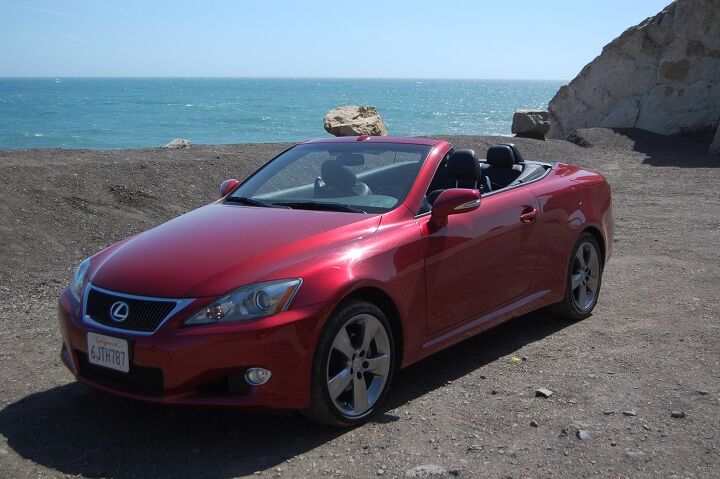





















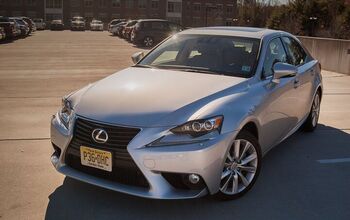
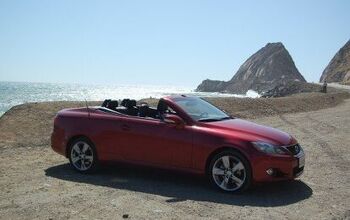
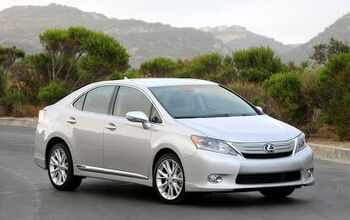
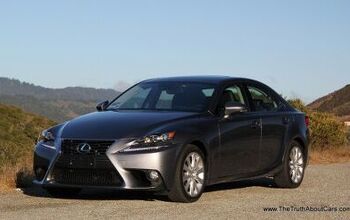
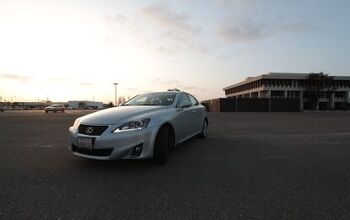










Comments
Join the conversation
Even better than a last gen BMW 3 series soft top - S4 Cab. Now there's some fun. Stick a $100 Garmin on the dash and you've basically got all of the "advanced technology" the IS has.
I looked at autotrader and wow!!! You´re a weird bunch. Why the Audi hate? Why in gods name is Lexus IS more popular than Audi A5??? Audi A5: 147 BMW 3 series: 504 Volvo C70: 241 Lexus IS: 260